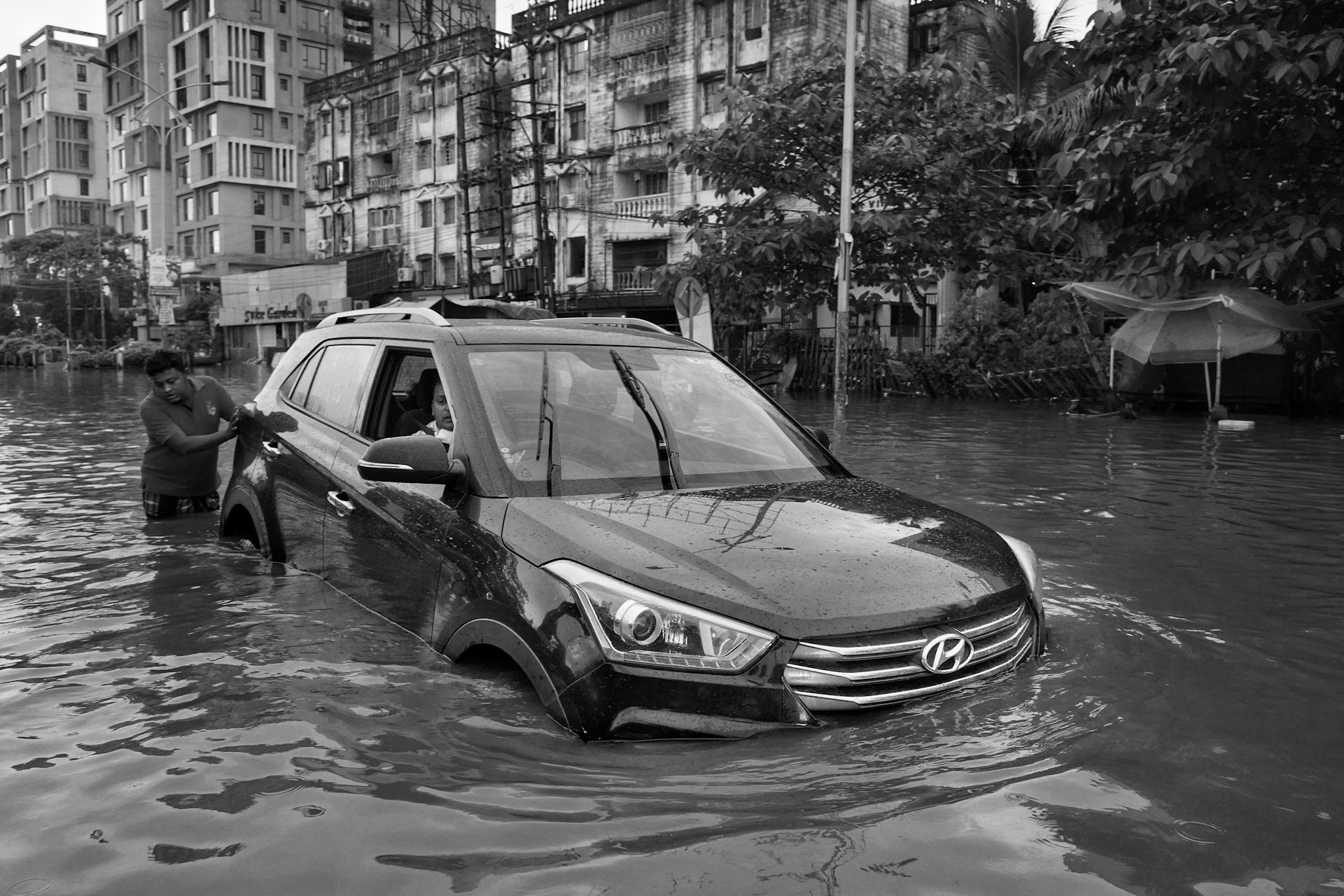
Apartment complexes require renters insurance to minimize their financial risk in case of damage or loss to the property. This is a common practice in the rental industry.
The cost of damages or losses is typically borne by the landlord, but with renters insurance, the liability is shifted to the renter. This helps to protect the landlord's assets.
Renters insurance also provides peace of mind for both the renter and the landlord, knowing that any unexpected events are covered.
What Are the Benefits?
Renters insurance provides financial protection for renters in case of unexpected events. It helps cover personal property loss or damage, which is often not included in a landlord's policy.
Renters insurance can compensate you if your belongings, like a bike, laptop, or television, are lost, stolen, or damaged. This can be a huge relief, especially if you have valuable items.
A renters policy can also protect you against liability claims from a guest injured while in your rental. This means you can enjoy hosting friends and family without worrying about potential lawsuits.
If you have a storage unit or keep your laptop in your car, renters insurance has got you covered. Your personal property is protected, no matter where it's located.
Here are some benefits of renters insurance:
- Compensates for lost, stolen, or damaged belongings
- Protects against liability claims from guests
- Covers personal property, regardless of location
By requiring renters insurance, landlords can potentially avoid liability claims from tenants due to damaged property caused by fire or other covered losses. This can be a huge relief for landlords, as it reduces their financial risk.
A unique perspective: Rental Condo Insurance for Landlords
Protection for Landlords and Tenants
Renters insurance can be a game-changer for both landlords and tenants. By requiring tenants to purchase renters insurance, landlords can have peace of mind knowing there's a recourse to cover losses in case of property damage.
Landlords don't have to worry about replacing personal property if a fire, flood, or natural disaster damages a tenant's belongings. In fact, a tenant's renters insurance policy may respond and pay for the landlord's repairs if their own insurance won't cover the damage.
Take a look at this: Insurable Interest in Property
If a tenant is involved in a lawsuit, renters insurance can keep landlords out of court by providing liability coverage. This can mitigate potential threats and reduce the risk of costly lawsuits.
Here are some natural disasters that can be covered under a renters insurance policy:
- Earthquake
- Fire Prevention
- Flood
- Hurricane
- Severe Weather
- Tornadoes
- Wildfires
- Winter Storm
In some cases, a landlord's rental dwelling policy may even benefit from having tenants with renters insurance. With fewer claims against their policy, landlords may see a reduction in their premiums.
If a tenant has a certain breed of dog, they may want to consider getting a personal umbrella liability policy on top of their renters' insurance plan. This can provide extra protection in case of an injury or lawsuit.
Consequences of Not Having Insurance
Not having renters insurance can have serious consequences, including financial ruin. You could end up paying thousands of dollars out of pocket to repair or replace damaged or stolen property.
One lawsuit can easily cost upwards of $10,000. This is why many apartment complexes require renters insurance as a condition of signing a lease.
You could lose your security deposit, which is usually a month's rent, and may not be enough to cover the costs of damages. This can lead to a difficult and stressful situation.
Without renters insurance, you may not be able to afford the costs of replacing or repairing your belongings. This can be especially tough if you have a lot of valuable items, such as electronics or furniture.
Renters insurance typically costs between $15 and $30 per month, which is a small price to pay for peace of mind.
On a similar theme: What Is Not Covered by an Umbrella Policy
Lease Requirements and Insurance
Landlords can require renters insurance in their lease agreement, but it's not a requirement in most states. However, some states like Oklahoma ban landlords from requiring renters insurance due to the landlord's own property and liability coverage.
A written lease agreement must specify that renters insurance is required, and tenants must be given a written notice to comply, which must give them at least 30 days to provide proof of renters insurance. This is a requirement in New York, but it may vary in other states.
You might like: Employer Health Insurance Cancellation Notice Requirement
If a tenant fails to provide proof of renters insurance within the specified time, the landlord can file an eviction lawsuit. In some cases, the landlord's insurance provider may pressure them into requiring residents to have renters insurance, which can help shift responsibility to the tenant and avoid messy lawsuits.
Here are some key points to keep in mind:
- Written lease agreement must specify renters insurance requirement.
- Written notice must be given to tenant with at least 30 days to provide proof.
- Landlord can file eviction lawsuit if tenant fails to provide proof.
Some landlords may also require tenants to name them as an additional insured, which can provide an extra layer of protection for the landlord. This is a common practice in the industry, and it's something to consider when signing a lease.
Lease Requirements
In most states, landlords can require renters insurance in their Lease Agreement, but Oklahoma is an exception. This is because potential losses to the landlord are typically covered by the landlord's own property and liability coverage.
A written lease agreement is required to specify that renters insurance is necessary. This agreement must be signed by both the landlord and tenant.
Landlords must give tenants a written notice to comply with the lease agreement, which must provide at least 30 days for the tenant to provide proof of renters insurance. If the tenant fails to comply, the landlord can file an eviction lawsuit.
Renters insurance can be required through a Lease Amendment or at renewal time, provided the tenant agrees or the lease terms allow for changes.
A landlord's insurance company may pressure them into requiring residents to have renters insurance, which can help avoid messy lawsuits and lower premiums.
Some landlords may require tenants to provide proof that they bought and maintain renters insurance, and may even request to be named as an additional insured along with the property manager.
Here are the key points to know about lease requirements:
If a tenant fails to provide proof of renters insurance, the landlord can file an eviction lawsuit, and the court may order the tenant to vacate the rental property and pay legal fees.
Non-Payment for Accommodations
Having a renters insurance policy can be a lifesaver for both landlords and tenants. If a tenant's apartment is damaged due to a fire or other catastrophic event, their insurance provider might cover temporary living arrangements. This means the landlord won't have to pay for the tenant's temporary housing costs.
Renters insurance can protect landlords from paying extra expenses for temporary accommodations. If a tenant has a renters insurance policy, their insurance company may cover temporary housing costs.
See what others are reading: Housing Loan Protection Insurance
Cost and Coverage
Renters insurance typically covers liability, additional living expenses, and the cost of repairing and replacing personal possessions, but not damage to the structure of a building.
Liability coverage is often the most important aspect for landlords, as it provides guests or neighbors a way to recover compensation if a covered tenant accidentally damages someone else's property or causes an injury. Minimum limits of $50,000 or $100,000 or more are common.
Coverage for a tenant's personal property is usually optional and depends on the value of their property, with varying limits and costs available.
Landlords often require tenants to show proof of coverage annually by submitting the insurance declaration document, and may send a notice to cure or quit if the tenant fails to provide proof.
Related reading: Personal Property Insurance Claim
How Much?
Liability coverage is the top concern for landlords, and they often require a minimum of $50,000 or $100,000.
Landlords may also suggest coverage for a tenant's personal property, especially if the tenant has valuable items.
Minimum limits of $50,000 or $100,000 or more are common for liability coverage.
Coverage for a tenant's personal property is usually optional and depends on the value of their belongings.
Landlords may require tenants to show proof of coverage annually by submitting the insurance declaration document.
Readers also liked: Insurance Carriers Use to Require
What Does Cover?
Renters insurance covers liability, additional living expenses (ALE), and the cost of repairing and replacing personal possessions. It's similar to homeowners insurance, but with a key difference: it doesn't cover damage to the structure of a building.
Both renters and homeowners insurance policies provide coverage against losses from fires, theft, wind storms, and some forms of water damage. However, they typically won't cover damages following floods or earthquakes.
You can get renters flood coverage from the National Flood Insurance Program or a private insurer, and add earthquake coverage as an endorsement or separate policy.
Renters insurance has two main components: personal property protection and liability protection. Personal property protection covers losses due to fire, flood, theft, or other disasters. Liability protection covers negligent actions by the renter that harm others.
You can obtain both property and liability coverage at various limits, depending on how much protection you need. This is especially important if you have expensive items or a lot of guests coming over.
Here's a breakdown of what's typically covered under renters insurance:
- Personal property protection (e.g. furniture, clothing, electronics)
- Liability protection (e.g. accidental flooding, guest slip and fall)
- Additional living expenses (ALE) in case you need to temporarily relocate
- Injuries to workers you hire and invite in (e.g. housekeeper, babysitter)
Keep in mind that your landlord's insurance policy will cover the cost of repairing the structure of the building if you damage it. However, you'll still have to pay a deductible. If you have renters insurance, your policy should cover this deductible.
A fresh viewpoint: Lemonade Renters Insurance Deductible
Get Coverage
Landlords can buy renters insurance for their tenants and include it in the lease, with the policy being in the tenant's name and covering their personal property and liability.
This option can be convenient for tenants, allowing them to purchase coverage during the application or leasing process.
Some large landlords or property managers partner with insurance companies to provide tenants with discounted coverage, making it a cost-effective option for both parties.
By being listed as a covered party on the liability claims, landlords can receive notifications about changes to the policy, giving them a level of control and awareness.
A unique perspective: Hazard Insurance for Rental Property
Frequently Asked Questions
Can a landlord in Iowa require renters insurance?
While there's no federal law requiring renters insurance in Iowa, some landlords may include it as a lease agreement condition. This means you should review your lease carefully to see if renters insurance is a requirement.
Does everyone need renters insurance in an apartment?
Typically, each roommate needs their own renters insurance policy, but it depends on your landlord's requirements. Check your lease to see if renters insurance is mandatory
Sources
- https://www.statefarm.com/simple-insights/residence/can-landlords-require-renters-insurance
- https://honigconte.com/blog/business-insurance/can-landlord-require-renters-insurance-new-york/
- https://www.icnj.com/blog/why-do-landlords-require-renters-insurance/
- https://www.rocketlawyer.com/real-estate/landlords/residential-property/legal-guide/can-landlords-require-renters-insurance
- https://www.hippo.com/blog/can-landlords-require-renters-insurance
Featured Images: pexels.com

